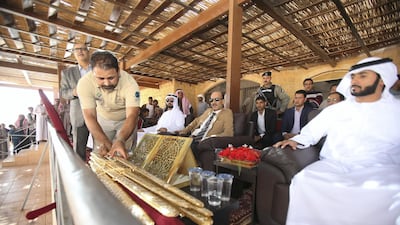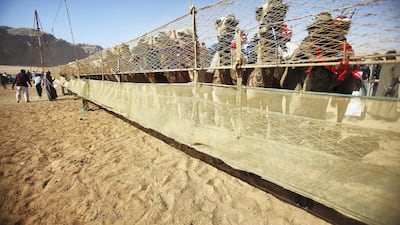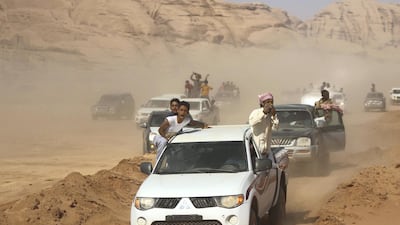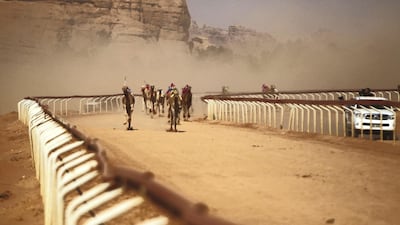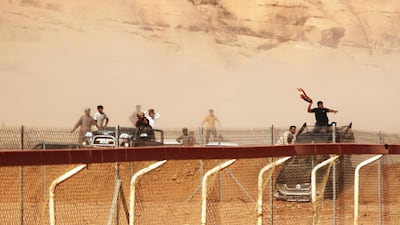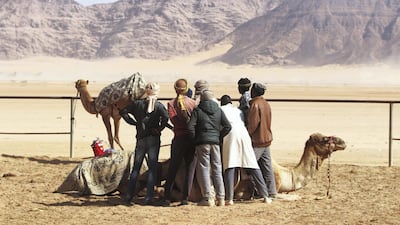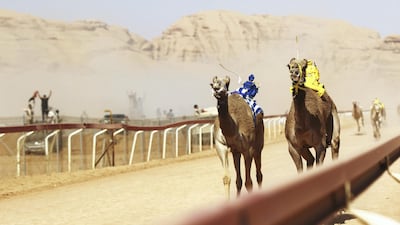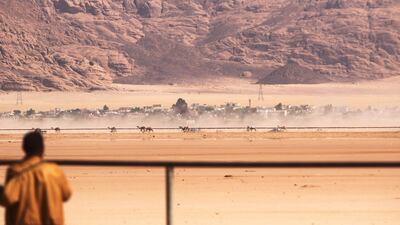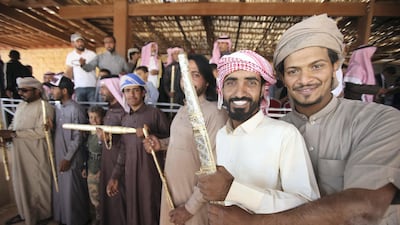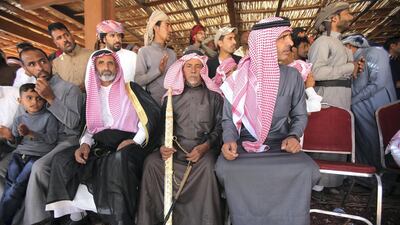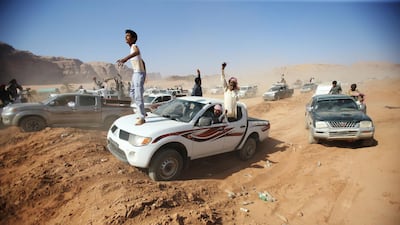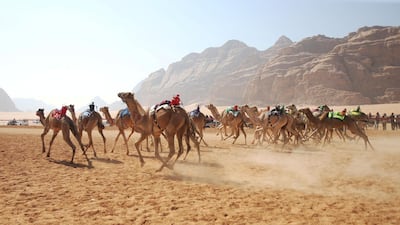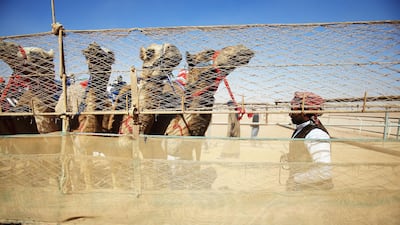As dawn broke over the horizon of the red-rock ridge in Jordan's Wadi Rum, dozens of pick-up trucks rumbled from the distant deserts, kicking up a haze of dust as they approached the race track.
Soon, tens of barefoot boys led packs of tethered camels, three to four each, trudging them to the racing grounds from nearby sand-dunes where they had spent the night.
Entire families and packs of friends from across southern Jordan who had camped out nearby for the better part of the week descended onto the Sheikh Zayed bin Sultan Camel Stadium, wrapped in wool farwa robes and red-and-white shmagh head-covers.
For this weekend was no normal race. It was the championships.
“This is the race we have all been training for,” said Abu Saqer Al Howaiti.
All the trappings of a modern-day sporting event were present at the Sheikh Zayed bin Sultan Al Nahyan Camel Race Festival, where 500 camels faced off in Wadi Rum, southern Jordan, this Friday and Saturday; a permanent race-track, live TV feed, colour commentators, and cameramen to capture photo-finishes.
Yet in what marked the 12th edition of the UAE-sponsored race that has transformed camel racing in this kingdom from a pastime to an organized year-round sport, it takes only a few minutes to discover how little Jordanian camel racing has strayed from its humble Bedouin roots.
“This is not a sport, this is an inheritance from our ancestors,” said Mr Al Howaiti, 45, who had three camels in the race, carrying on five generations of camel racers.
“As long as there have been people on this Earth, there have been Bedouin, and as long as there have been Bedouin there has been camel racing.”
Just 25 years ago, camel racing here was a communal, spontaneous affair; races were held during the Eid holiday or as entertainment to mark a wedding.
Rather than sit in the shaded grandstand, most here in Wadi Rum on Friday preferred to stand on the track inches away from the approaching camels, just as their fathers and grandfathers would have done.
For a bird’s-eye view of the races, others sat on the roof of their trucks, water tankers, and on cartons.
But the real action is in the truck; think Mad Max meets Lawrence of Arabia.
Just as in camel races a few decades ago, when the entire family would run alongside their camels, racers on Saturday loaded their pick-up trucks with their brothers, cousins, and sons to drive together around the track as they direct their automated camel jockeys.
Some even squeezed their entire family of seven, with young men hanging out of the windows.
With one hand on the steering wheel, the other in his walkie-talkie, and a remote controlling his robot jockey balanced between his fingers, and one son in the truck bed, Abu Ahmed Howaiti roared around the track, swerving between the trucks of his fellow racers with one eye on his camel.
“Hat-hat-hat, yalla, yalla,” he said into the walkie talkie to a speaker on his camel.

Within minutes he slammed on the breaks, as he and the fellow racers slowed into a halt, hitting their remote for their camels to come through.
What did he place? “Tenth, I think, or maybe eighth,” Mr Howaiti said, nonplussed.
“The important things is that we placed at all.”
“Nobody here is in it for the money or the fame,” said Mohammed Zuwaydeh, 19 as he photographed the finishline from the roof of his cousin’s pickup. “Everyone is here for bragging rights and personal honour.”
Costly venture
Far from being a profession, camel racing in Jordan is a passionate hobby- and an expensive one at that.
Some of the top racers gathered on Saturday hire full-time trainers, either Jordanians or Sudanese, who run the camels each day and monitor their special diets- a full-time position that pays JD400 a month, nearly double the minimum wage here.
Others struggle to train camels themselves as they have inflexible work hours, while their brothers, nephews, cousins and sons are either studying, or increasingly, migrating to the capital to work.
With rising price of nutrient-rich animal feed, vitamins, and various check-ups and blood tests, maintaining a racing camel costs JD3,000 to JD4,000 a year.
The only hope Jordanian camel racers have to break even or, some hope, to make a profit, is to place among the finalists in this weekend’s race and other annual races in Saudi Arabia, the UAE and as far away as Tunisia and Algeria.
Financially, most of Jordanian camel racers are running in the red.
“Camel racing is expensive and your best bet is to break even,” says Ahmed Huwaiti, as the ninth round on Friday rumbled past on the sidelines. “but more often than not, it is an annual loss.”
“With the tough economy, more of us are becoming spectators rather than racers,” said Mr Huwaiti, who sold off his three racing camels two years ago.
Struggling Bedouin have an incentive to sell-out; top-finishing racing camels in Jordan can sell for up to JD30,000 to Gulf buyers, multiple first-place finishes can earn up to JD300,000.
Tribal role
As the stakes ran high this weekend, so too, at times, did tempers.
Following the end of the fourth round on Friday, one racer got out of his truck and yelled at a rival who he claimed clipped the fender of this truck, spinning him off course and preventing him from steering his camel in the final seconds.
The argument escalated; shoes were thrown, words were said. The dispute turned into a full-out scrum as dozens of fellow racers rushed to separate the two men.
And then suddenly, without a word, the men were peacefully separate and calm was restored- a settlement that speaks to Jordanian racing’s Bedouin roots.
“Here in Jordan, tribes settle disputes and keep the peace,” says Abdullah Zuwaydeh, a former racer and spectator. “Whether it be on the streets or on the race-track, we are the peacemakers. This is how we are in daily life and in sport.”
Abeed Zawaydeh, Al Dissah mayor, race organizer and member of the Jordanian camel racing committee, says the UAE has been critical in preserving and developing of camel racing here; funding the construction of the racetrack and sponsoring the yearly race held under the patronage of UAE President Sheikh Khalifa.
After long being overlooked, the Bedouin pastime here is growing.
But even with all the modernization of Jordanian racing, all agree a first-place finish all comes down to one thing.
“We may not have the local funding or government support racers in other countries have, but in Jordan we have a secret advantage that place us among the very best,” Mr Zawaydeh, the mayor, said as he ticked off the finalists from a list of scrap paper. “Heart.”
